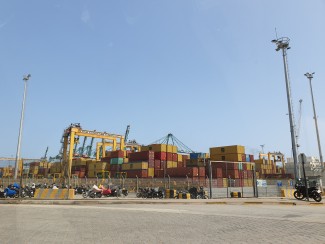In countries where farming sustains families and economies, sustainable trade in agricultural products means everything
Buba Jawneh's family business lies off a dirt road outside The Gambia's capital of Banjul. Behind the white walls facing the street is a small compound of interconnected buildings surrounding a courtyard filled with their income generator – cashews.
The Jawneh & Family Cashew Processing Enterprise has expanded from its beginnings in 2008 when Buba's father decided to start processing the cashews he was growing on his farm.
Today, cashew processing supports the extended family, and for The Gambia, it is a sector with lots of promise.
According to one cashew farmer, raw cashews sell for approximately 3,000 dalasi (USD 62) per bag, which holds about 85 kilos. Processed cashews, on the other hand, can sell for between 5,000 and 10,000 dalasi. The Jawnehs trade in approximately 2,000 processed kilos a month, so are garnering somewhere between and USD 2,400 and 4,700.
This is the government's trade strategy in action, a plan that looks to target the cashew sector and the country's small enterprises and farmers, giving them the funding, information and materials needed to boost their businesses. And the Jawnehs are now packaging their roasted nuts for local supermarkets as well as sending them to various buyers outside the country, armed with food safety certification and packaging and branding materials from the Enhanced Integrated Framework (EIF).
They also now have about 40 employees, including Binta Bogang, who is quietly and carefully using a small blade to peel cashews in one section of the compound. Twenty-two years old, she is paying her way through law school doing this work.
And it is not only The Gambia, with other countries on the continent recognizing that agriculture is what supports their poorest citizens, therefore looking to boost their incomes by boosting agriculture exports.
“Most people in Comoros work the land, and focusing on this sector will have a direct impact on our people and their families,” said Comoros Vice President in Charge of Economy, Energy, Industry, Handicraft, Tourism, Investment, Private Sector and Land Affairs Djaffar Ahmed Said Hassani.
The islands produce ylang-ylang, vanilla and cloves that get high prices in international markets yet aren't getting there in quantities, and production isn't up to potential. So the Government of Comoros, EIF and the United Nations Development Programme (UNDP) went into action in 2014, realizing the huge impact on the poor this could have.
Cooperatives were formed so harvesters, distillers and processors were better organized and united to obtain better prices, and local entrepreneurs were boosted with trainings and market access.
Houria Said Muhammed runs her own business, NectaLab, and received support with packaging and branding of her artisanal beauty products forged out of Comoros' high-end agricultural harvests.
“I receive the ylang-ylang essential oil from the distillery. I then go on to dry and filter the essential oil to make sure it’s clear and pure… We are very proud because it’s a local product that is in demand all over the world,” she said.
She added, “My dream is to no longer have a small laboratory at my home. But instead to create an enterprise and employ a lot of people."
In Malawi, the Government too has targeted agriculture and trade, looking to diversify from a previous focus on tobacco and corn to soy and peanuts.
A pilot partnership with the National Smallholders Farmers' Association and EIF saw incomes increase by more than 300 per cent for farmers who got training in soy planting techniques and land to practice on.
“I used to not have a house. I was unable to look after my children,” said Bester Glandson, one of the initial group of farmers.
She said that, following the partnership, "My life has improved a great deal. We are making a good profit. I'm now able to buy clothes for my children. I'm able to feed them."
If you would like to reuse any material published here, please let us know by sending an email to EIF Communications: eifcommunications@wto.org.



